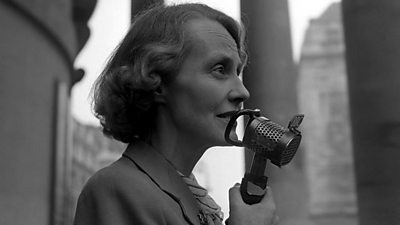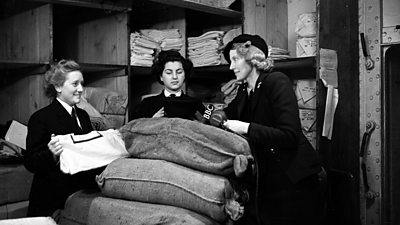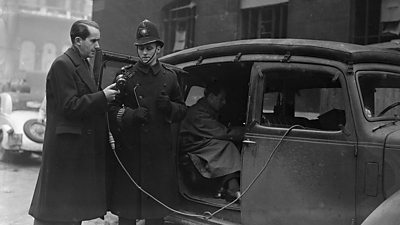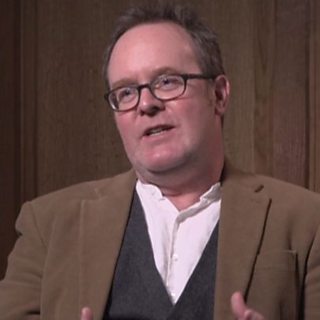In the Second World War, the ±«Óãtv was a global broadcaster. It saw radio as a force to bind together the various nationalities enlisted in the Allied cause, from Jamaica to Australia, and a subtle means of encouraging America to join the fight against Nazism. Here, the ±«Óãtv’s archives provide new insights on broadcasting’s wartime role in the arena of soft-power politics and cultural diplomacy.
Regular ±«Óãtv broadcasts for listeners overseas had begun some seven years before the war, on 19 December 1932, with the launch of the Empire Service. It was designed essentially for British emigrants who had settled abroad, its English-language programmes a manifestation of an imperial mind-set which placed London at the centre of a global communications network.
Malcolm Frost, who later joined the ±«Óãtv to help set-up its Monitoring Service, happened to be in South Africa on the day of its launch, and recalls struggling to hear the ±«Óãtv’s signal at all. The ±«Óãtv’s efforts to send programmes across great distances was hugely limited by the number of transmitters it could afford to build and its reliance on short-wave.
In his interview for the ±«Óãtv Oral History Collection, Frost’s main criticism was that the original Empire Service merely provided programmes for Britons living abroad, or, as he calls them here, the 'English exiles'.
What was really needed, he believed, was foreign-language services for everyone else:
The ±«Óãtv’s move towards what Frost called 'indigenous programmes' began in January 1938 when it launched an Arabic-language service in response to wireless stations broadcasting Italian and German propaganda across the Middle East.
Two months later, it began broadcasts for Latin America in Spanish and Portuguese. Its English-language programmes also kept expanding. Towards the end of the war the ±«Óãtv was broadcasting in over forty-five languages.
Stuart Williams was a senior administrator in what was soon being called the 'Overseas Service', which, along with the new 'European Service', made up the ±«Óãtv’s combined 'External Services'. It was a vantage-point, which allowed him to witness this steady growth at first hand:
As Williams suggests, wartime brought additional responsibilities for the ±«Óãtv’s foreign broadcasts: to offer not just a link with the British diaspora, but an active effort to share with Allies, and potential Allies, a clear picture of why the country was fighting the Axis powers – and why the Allied effort would prevail in the end.
One of the wartime programmes for overseas listeners which had an immediate and widespread impact was Radio Newsreel, broadcast continuously from July 1940 onwards. It was a programme about the day’s news, rather than a mere re-telling of events. It hunted-down ‘radiogenic’ stories, and arranged them in a lively and varied running-order. A sense of immediacy was always paramount.
Much of Radio Newsreel’s pacey style was down to the influence of Canadian broadcasters based in London, as well as its talented editor, Peter Pooley. But one of its best British reporters was Audrey Russell, who would later became the first female ±«Óãtv war correspondent.
In her archive interview, Russell recalls the frenetic working-life, with different editions being made for different parts of the world:

There was one on the African Service that I think was half an hour, the North American edition I think was a quarter, Overseas half an hour, European... probably half an hour... They varied all the time according to the war or the situation.
She also offers a snapshot of the studios and offices in which Radio Newsreel was made, and where, for much of the war, the ±«Óãtv’s Overseas Service was based:

"Programmes went out from the basement studios of what was to become, this was my first location in the ±«Óãtv, of what was to become a very famous address, formerly the Oxford Street store, Peter Robinson. And it was converted into ±«Óãtv premises, war premises. It was like a fortress: all the windows were bricked-up… The ground floor was really a huge canteen and this was invaluable because people went there night and day. I don’t think that canteen ever closed because of course Radio Newsreel went on all through the night… the food was war food, but you worked so hard you didn’t sometimes have time to even buy your rations, so you ate there."
Another of the ±«Óãtv’s successes was Calling the West Indies, which began regular transmissions in 1943.
This series had a strategic purpose, too: providing a bridge between Britain and its overseas colonies in which serving men and women from the Caribbean could send messages to their families and friends back home.
Its character, a mix of personal messages, heart-warming music, and uplifting tales of dedicated war-work being undertaken in a country apparently free from racism, was featured in a 1944 cinema newsreel, West Indies Calling:
In the film, the young radio producer acting as compere was Una Marson. She was originally from Jamaica, and an experienced journalist and published writer by the time she joined the ±«Óãtv in 1939. Her career is discussed elsewhere in this 100 Voices that Made the ±«Óãtv series, in a section called ''.
Marson worked in the relatively junior position of ‘Programme Assistant’ in the ‘Empire Programmes’ department. But her influential role in Calling the West Indies is a reminder of the extraordinary wide range of international audiences which the ±«Óãtv had to consider in wartime.
There were some 12,000 men and women from across the West Indies who had come to serve in the British forces, and thousands more relatives back home eager to hear all about the contribution they were making.
Though largely unknown among British listeners, Marson represented a key link in the ±«Óãtv’s global communicative chain.

One wartime broadcaster who enjoyed a much higher profile, both in Britain and abroad, was Ed Murrow, the London-based reporter for the American CBS network.
During the Blitz, especially, Murrow, along with other US correspondents, was consistently given generous access by the ±«Óãtv and Government officials to inspect the scenes of air raids and to talk to service personnel and civilians, so that he could convey to American audiences the experiences of a country under intense siege.
His editorial judgement, his evident skill with words, and his palpable warmth towards the ±«Óãtv as a host endeared him greatly to the inhabitants of Broadcasting House, where he would frequently be found at night drinking and chatting with the Corporation’s senior news editors.
John Snagge was among those who often met Murrow on these occasions, and took the opportunity of his archive interview to pay him a warm tribute:
Murrow’s journalism, and the ±«Óãtv’s willingness to give him ample access to its facilities, certainly helped American listeners to understand more fully the nature of the European war. ‘You burned the city of London in our houses’, he was told later by a fellow broadcaster back in the US. ‘You laid the dead of London at our doors and we knew the dead were our dead... were mankind’s dead – and ours.’
Such was the power of his reportage, that Murrow’s work has often eclipsed other dimensions to Anglo-American co-operation during this period of the war. In London’s West End, for instance, Cecil Madden, the great impresario of the ±«Óãtv’s pre-war television service, was busy running an ‘Empire Variety Unit’.
As he explains in this archive interview, the Unit created an unending stream of live entertainment shows for broadcasting to civilian and military audiences around the world. And it made one programme in particular which proved to be a pioneering example of trans-Atlantic co-production:
While Murrow’s reports reached American audiences directly via his own CBS, most of Madden’s shows, along with series such as Radio Newsreel, would have been heard in the US via the ±«Óãtv’s new wartime North American Service. And it was in this corner of the ±«Óãtv that the writer-producer Alan Melville developed what amounted to the British radio’s first ‘soap opera’ – Front Line Family:
The ±«Óãtv’s head of drama, Val Gielgud loathed the whole idea of a continuing series such as Front Line Family. But wartime imposed its own demands. And the man who then ran the North American Service, Maurice Gorham, was convinced the ongoing story of the Robinson family’s struggle to endure the bombing, the blackout, and rationing, brought home to listeners in the US and Canada the realities of war ‘better than either news or talks could do.’
Once America had entered the war, a different kind of broadcasting was called-for.
The stationing of hundreds of thousands of GIs in Britain presented the same sort of challenge as that which confronted the Overseas Service in its treatment of service men and women from the Caribbean: the need to provide them with a link to their families back home.
Once again, Cecil Madden was involved – this time, through a show called the ‘American Eagle in Britain’:
Of course, wartime Allies could also fall-out, especially when it came to competition over shared facilities and scarce resources.
One particularly serious diplomatic crisis nearly erupted when the ±«Óãtv rejected American demands for favourable access to its European Service, so that it might send coded messages to its own undercover operatives.
The request had come from a small team of Americans engaged in psychological warfare operations, who felt that the US, as a major ally of Britain, was entitled to more time on the ±«Óãtv’s schedules than ‘smaller’ allies such as the Dutch or the French or the Polish, and that its own secret operatives were rather more important than those of the other nationalities.
Whether the ±«Óãtv was offended by the arrogance of this American request, or simply made a calculated judgement that the coded messages of its European allies were, in fact, just as valuable to the war effort, is unknown. But in any case, the Corporation held firm, and responded with a principled refusal to cut back the airtime it had promised to other nations.
The only account of the row comes from an American perspective: an interview in the ±«Óãtv Oral History Collection with William Paley, the influential head of CBS, who was then serving as director of radio operations for the American psychological warfare unit inside the London base of ‘Supreme Headquarters Allied Expeditionary Forces’ – or SHAEF.
There would be heated arguments later, too, when ±«Óãtv correspondents fell out with American generals over the coverage of D-Day and its aftermath: this is explored in the D-Day section of this website.
Despite such friction, there were long-term benefits for the ±«Óãtv in the regular exchange of facilities and personnel which wartime alliances demanded.
When Olive Shapley transferred to the Corporation’s New York office, for instance, it was possible to establish enduring contacts with important American figures. And, as this extract from her oral history interview shows, it gave her the chance to bring back to Britain an intriguing programme format:
Have a Go, hosted by Wilfred Pickles, would turn out to be one of the ±«Óãtv’s most successful post-war series.
But perhaps the most striking, and the strangest collaboration of all wartime productions, was The Man Who Went to War, a ‘ballad opera’ broadcast in 1944 to some 9 million listeners on the ±«Óãtv’s ±«Óãtv Service, as well as several million more via the European Service and the American military’s own radio network.
This remarkable programme had been conceived jointly by the ±«Óãtv producer Geoffrey Bridson and the great poet of the Harlem Renaissance, Langston Hughes. They’d first met in a New York bar late in 1943, and immediately recognised each other as kindred spirits: they both adored jazz and poetry, they both had an interest in progressive social ideas - and they both thought of radio as a vital means of communicating such ideas to the general public.
The two men cooked up a programme for the ±«Óãtv that almost certainly could not have been broadcast in racially segregated America at the time. The Man Who Went to War portrayed a family struggling to survive the London Blitz, and their son fighting in the battlefields of Europe. But while the story was utterly conventional, it’s approach was highly unusual.
All the parts were played by African-Americans, and the music consisted of spirituals and the blues. The message seemed to be this: that the British struggle against the Nazis was the same as the African-American struggle for civil rights in the US – indeed, part of the universal fight against oppression.
The songs were performed by Josh White. And its starry cast included Canada Lee, Ethel Waters, and the man who introduced it on air, Paul Robeson:
Further reading:
- Asa Briggs, The History of Broadcasting in the United Kingdom, Volume III: The War of Words 1939-1945 (1995)
- Maurice Gorham, Sound and Fury (1948).
- Jennifer Lewis (ed.), Starlight Days: The Memoirs of Cecil Madden (2007).

